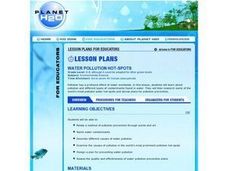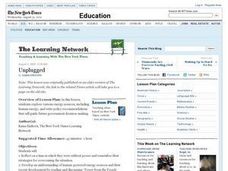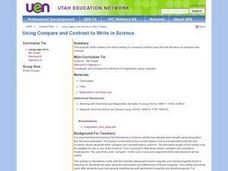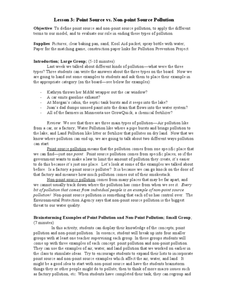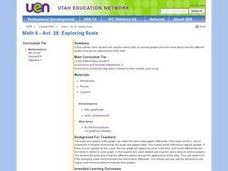Curated OER
Water Pollution Hot-Spots
Students complete internet research in small groups to identify types of water pollution, spotlight water pollution hot-spots, and design a plan for water prevention.
Curated OER
Save the Library!
Students discuss library resources and how to locate them by answering various scenarios. Role-playing as librarians, they write essays stating five reasons why the library should not be closed down.
Curated OER
Unplugged
Students read the article "Power From the People Breaks the Hold of Batteries and Plugs." Students work in groups to examine various sources of power. Students debate the advantages and disadvantages of each power source. They assume the...
Curated OER
Justice in America
Eleventh graders analyze primary sources for evidence of intent and purpose. In this American government lesson, 11th graders compose a one-page response explaining their understanding of "justice." Students read and examine quotes about...
Curated OER
Modern Counterculture Movements
Learners prepare a presentation examining anti-establishment activity by groups in society today. They prepare a presentation, on poster board or presentation software, about one contemporary protest group.
Curated OER
Early Colonial Labor Force: Indentured Servants and Slaves
Students study the labor force used during Colonial America. In this Colonial America lesson, students discuss labor types used in the colonies. Students read about indentured servants and the use of African slaves. Students use the...
Curated OER
Fads and Classics
Students discuss the types of clothes they have worn and why they have gone out of style. After watching a PowerPoint presentation, they identify clothes that never go out of style and compare them to the fads. To end the instructional...
Curated OER
Voting and US Resident Aliens
Twelfth graders examine the process of voting. In this American Government lesson, 12th graders evaluate the arguments for and against alien voting. Students participate in a debate on voting rights.
Curated OER
Using Compare and Contrast to Write in Science
Fifth graders investigate and compare the behavior of magnetism using magnets. In this physics lesson, 5th graders write about the similarities and differences of a variety of magnet types.
Curated OER
Bias vs. Perspective: An Inevitable Aspect of Journalism?
Students explore the types of media that U.S. teens prefer the ways in which viewers identify and account for journalistic bias. They explore the ways in which media shapes one's opinion or affects their judgment.
Curated OER
Political Systems
In this political systems worksheet, students discuss the type of society they would prefer, a class-less one regulated by democracy or a society with all levels of income and wealth, regulated by free market.
Curated OER
Point Source vs. Non-point Source Pollution
Young scholars define and differentiate between point source and non-point source pollution. Students discuss various types of pollution including air, water and land pollution, analyze demonstrations and complete a worksheet.
Curated OER
Michigan Court System (Part 1) (Middle School)
Students identify the courts that make up the Michigan judicial system. They explore the responsibility of each court and diagram how cases move to the Supreme Court. They compare and contrast the different types of courts.
Curated OER
A Date Which Will Live in Infamy
High schoolers analyze Franklin D. Roosevelt's "Day of Infamy" War Address. Students read the original first typed draft of the speech, and compare handwritten changes with the original to determine whether the changes strengthened or...
Curated OER
Water Use and Conservation
Young scholars discuss the different types of water found on Earth. They discover why not all water is used for drinking and calculate how much water they use. They create their own water conservation plan.
Curated OER
Pyramid Play
Students investigate the concept of the Food Pyramid. They use a game as a tool of discovery in order to classify different types of food in the pyramid. Upon completion of the game the students construct their own models of it.
Curated OER
Explora-Pond: 1st Grade Shore Count
First graders experience addition through the exploration of a virtual pond. They categorize the various plants around the pond, count the number of various types of plants on the pond shore, and calculate the number of shrubs.
Curated OER
How Many? How Far? How Thick?
Fifth graders examine the role of magnetism and electricity. In groups, they are given different types of magnets and discover how the magnetic force differs for each one. They measure the amount of distance a paper clip moves toward...
Curated OER
The Fourth Plinth
Students examine London landmarks. In this government lesson, students read a selection (the selection is not included) regarding an art project in London. Students discuss the content of the reading selection.
Curated OER
Exploring Our Community
Students identify nonprofit and profit organizations in their community. They discuss why it is important to have both types of organizations. They create a land use map of their community.
Curated OER
Tropical Regions/Mapping Biodiversity
Pupils use a world map to locate the country of Puerto Rico. In groups, they identify the various types of vegetation found on the island. They compare and contrast the biodiversity of the country to the United States. To end the...
Curated OER
Sizing Up Sound
Sixth graders are introduced to the concepts of sound waves and frequency. As a class, they listen to the differences between different types of instruments. To end the lesson, they practice identifying low and high pitches and playing...
Curated OER
Exploring Scale
Sixth graders discuss how the scale and type of graph can change how the data appears. With a partner, they identify all the information about the graph in a specific amount of time and record them in a journal. To end the lesson, they...
Curated OER
Labor, Choice, and Sales Tax
Learners consider the idea of earning and spending money. For this money management lesson plan, students discuss the concept of saving and spending money through the reading of a story and by completing several activities that involve...


